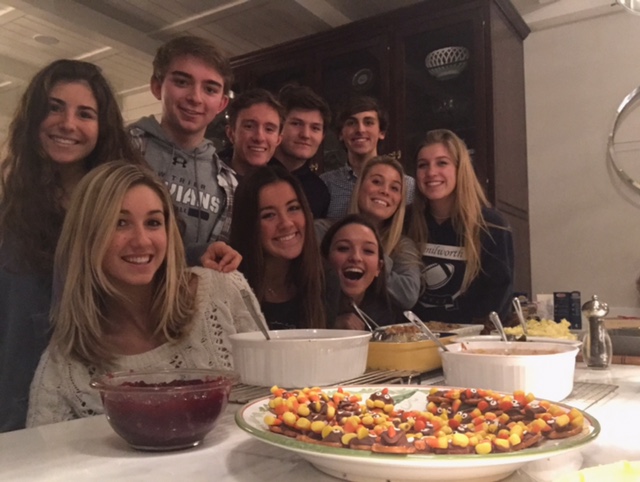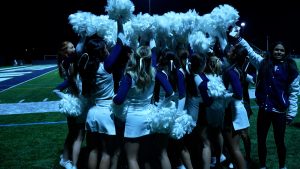Friendsgiving: millenials cook up a new holiday
Friendsgiving is a new take on the traditional holiday
December 1, 2017
As if one night full of gratitude, pumpkin pie, turkey, and a whole lot of gravy wasn’t enough, people have recently found a way to double their Thanksgiving experience.
On top of the typical dinner with family, many have indulged in a night with their best friends, a night that has been coined Friendsgiving.
Instead of excruciating small talk with distant family members, Friendsgiving contains nothing but good times with friends.
Not to say Thanksgiving is an unpleasant holiday, but avoiding conversation with your obnoxious uncle or that relative that you’re unsure how you are related to is no longer an issue.
Either way, people have taken advantage of the extra day of thanks during their long weekend.
Senior Joseph Musolino hosted his own Friendsgiving this year. His friends contributed in making their own personal feast.
“In terms of preparing food, everyone brought ingredients to my house and we all cooked together. It got really messy, but it turned out really well,” he said.
“Friendsgiving is better than regular Thanksgiving because you’re able to choose who comes. There aren’t any of the forced conversations that come with a regular Thanksgiving,” said Musolino.
Junior Sophie Sabo also attended a Friendsgiving, hosted by her friend Cameron Compall. She found herself a bit more at ease at this dinner compared to her family Thanksgiving.
“It is way less serious and more casual to be around all your friends instead of all your family,” said Sabo. Like Musolino’s dinner, she said everyone contributed in creating a meal with a variety of food.
On top of being thankful for family, Friendsgiving allows people to show their appreciation for friends. Usually everyone goes their own way for Thanksgiving, but now the thankfulness can reach everyone.
“[Friendsgiving] is a lot different than regular Thanksgiving because we all spend Thanksgiving with our families and we don’t get to appreciate the gratitude we have for our friends,” said sophomore Alexandra Riedinger.
Riedinger took part in a dinner hosted by fellow sophomore Julia Belian. The group enjoyed a delicious meal and a main course made by Belian’s mother.
The Friendsgiving phenomenon started trending sometime around 2008, and over the years, has made an upward spiral and even landed in the Urban Dictionary.
“The celebration of Thanksgiving dinner with your friends. This usually occurs on the Wednesday before or the Friday after Thanksgiving Day, since Thanksgiving is usually reserved for family gatherings.”
Students didn’t feel that the holiday needed to be the day before or after, but Friendsgiving rarely ever takes place on the Thursday. Unless, of course, it is used as a replacement for the actual holiday.
Some point to popular television shows as the mastermind behind this new holiday. Friendsgiving has been seen on shows such as “Friends” and “How I Met Your Mother”. The characters in the show would consider it a crime if they had not spent a Thanksgiving weekend without their closest friends.
Another reason for the popularity of Friendsgiving would be “loving the ones you’re with.”
At times, it is difficult to reconnect with family, especially if the distance between homes is too overwhelming. The reality is that it is not always possible to make it home, so people resort to feasting with those close by, often friends.
Of course, again, it may just be an excuse to extend the Thanksgiving festivities. I mean, who wouldn’t want another night with delicious food and great company?
Stores and food companies have caught on to the trend. Grocery chains such as Peapod advertise recipes and encourage the Friendsgiving hashtag, which has seen rising popularity on social media.
“It was just fun to be with all my friends and have everyone bring really good food,” said Sabo.














































